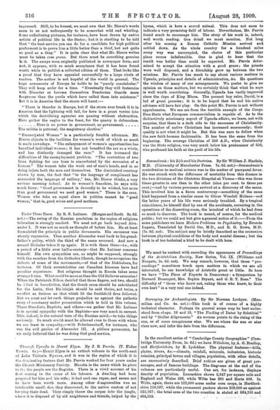Throvgh Uganda to Mount Elgon. By J. B. Purvis. T.
Fisher Unwin. es.)—Mount Elgon is an extinct volcano to the north.east of Lake Victoria Nyanza, ard it was in the region of which' it is he dcninating feature that Mr. Purvis worked for four years under the Church Missionary Society. Mamba is the name which he gives to it ; the people are the Bsgishu. There is a vivid account of his fi:st coming to the scene of his labours. A dwelling bad been prepared for him and his wife ; it bad cost one rupee, and seems not to have been worth more. Among other d'sagreeables was an intolerable smell, due, they discovered, to the native custom of not bnrying their dead. They simply throw the corpse into the jangle, where it is disposed of by old neighbours and friends, helped by the hyena, which is here a sacred animal. This does not seem to indicate a very promising field of labour. Nevertheless, Mr. Purvis found much to encourage him. The story of his work is, indeed, well worth reading. One detail we must mention. Not long after his coming a Roman Catholic Mission arrived and settled down. As the whole country for a hundred miles every way was unoccupied, the choice of this particular place seems indefensible. One is glad to hear that the result was better than could be expected. Mr. Purvis deter- mined to accept the situation with a good grace ; the priests were well disposed, and a friendship grew up between the two missions. Mr. Purvis has much to say about various matters in Uganda, principles and details of administration, &o. He questions the wisdom of many of our arrangements. We prefer to give no opinion on these matters, but we certainly think that what he says is well worth considering. Generally, Uganda has vastly improved since the days of King Mtesa. The present boy ruler, David, is a lad of great promise ; it is to be hoped that he and his native advisers will have fair play. On this point Mr. Purvis is not without apprehension. We can see from the terrible example of the Congo Free State what European commercialism is capable of. As to the distinctively missionary aspect of Uganda affairs, we learn, not with surprise, that there is a dark side to the successes of Christianity. The number of native Christians has increased enormously; their quality is not what it might be. But this was sure to follow when the new faith became fashionable. It has been the same from the beginning. The average Christian of 350 A.D., when Christianity was the State religion, was very much below his predecessor of 250, who professed his faith at the peril of his life.






































 Previous page
Previous page